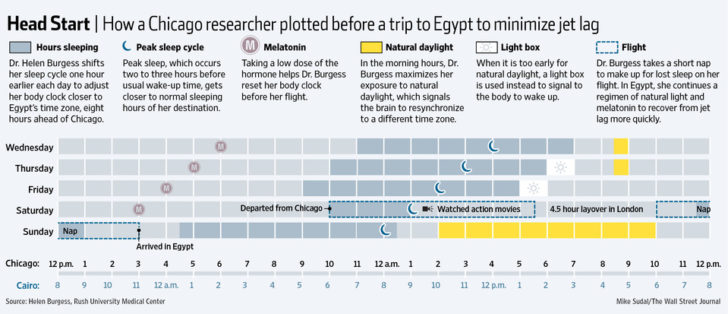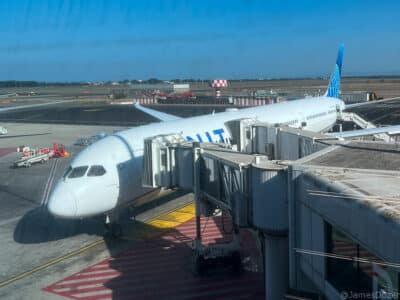I’m paraphrasing the title of a Wall Street Journal article that ran Tuesday morning, but you might be surprised to learn how obsessive some scientists can be about measuring and manipulating their well-being. My sister had a chemistry professor during her undergraduate years who attempted a restricted calorie diet after reading about longevity studies in mice. He became a ornery, unhappy person until he finally gave it up …two years later.
So it’s no surprise to me that there are people who take a careful approach to designing the perfect “training” regimen to adjust their sleep cycle before a long trip. One of my former labs did circadian studies, and there is a lot more that goes into your sleep patterns than just daylight. The spectrum of light matters. Hormones fluctuate. Your body temperature fluctuates. So many things are happening with feedback and feedforward processes to make sure you fall asleep each night and wake again in the morning. My original dissertation research looked at the role of one such protein and its importance in memory consolidation.
I’m about to get on yet another redeye flight to Toronto for TBEX this weekend (I’ll have arrived by the time this goes live) so the timing of the article was especially appropriate, and it has some good tips if you want to try adjusting your own sleep patterns before the next long trip.

My personal approach is very simliar to the one used by Dr. Burgess on her trip to Egypt. I don’t use melatonin, however, because I’ve never found it to have any significant effect. I also don’t use sleeping pills or alcohol, which don’t seem to work, either. No, the best approach for me is just to wake an hour earlier each day. It works out great, actually, since my morning hours are the most productive and I have no problem staying alert in the morning with or without coffee.
The reason I adjust my sleep cycle is not to help me wake up at my destination but to help me stay awake later in the day. Times when I’ve attempted to stay up on a long trip from the West Coast to Europe have not turned out well, and I usually collapse by about mid-afternoon. Coffee doesn’t do much good for me, either, except make me jittery. Lack of sleep still makes me tired either way. I’m lucky that I’m still in my late 20s, yet I already feel things getting more difficult as I age.
I do have a limit on waking up early. I’m not going to do it for a time change of only one or two hours. And even if I’m flying halfway around the world the most I will shift my clock in advance is three hours. At some point I just know I’m going to need to go to bed early my first night to catch up.
Sometimes I’ll schedule stopovers or layovers of less than 24 hours in order to give myself a chance to adjust along the way. If I were flying from Seattle to Istanbul, for example, I’d rather spend the night in Frankfurt than connect immediately and arrive at my destination incredibly tired.
Or on days like today, I didn’t adjust my clock in advance but I did wake up pretty early. Remember, I can wake up quickly, so the challenge is to stay awake. My hope is that, pills or no pills, I’ll drag myself onto that 11:50 departure and conk out for at least a good 3 hours. And that might just hold me through a second round of drinks at the first party Thursday night. 😉




